Apr 2019 1st Edition
Apr 2019 1st Edition vuyelwan
Translations
Agricultural project brings hope
Agricultural project brings hope vuyelwanAn agricultural project run by a group of people living with hearing impairment is creating jobs for the deaf community in Rand West Local Municipality.
The Voice Out Deaf Cooperative is one of the five cooperatives found in the Rand West Agri-park, which is one of the agri-parks that has been on full operation for more than two years.
Matebogo Victoria, a member of Voice Out Deaf Cooperative, said the main aim of the cooperative was to create jobs and employment opportunities for the deaf community.
But overall, she said, the objective of the project is in line with the government agricultural policy of increasing food production and attaining sustainable food security and subsequent poverty reduction.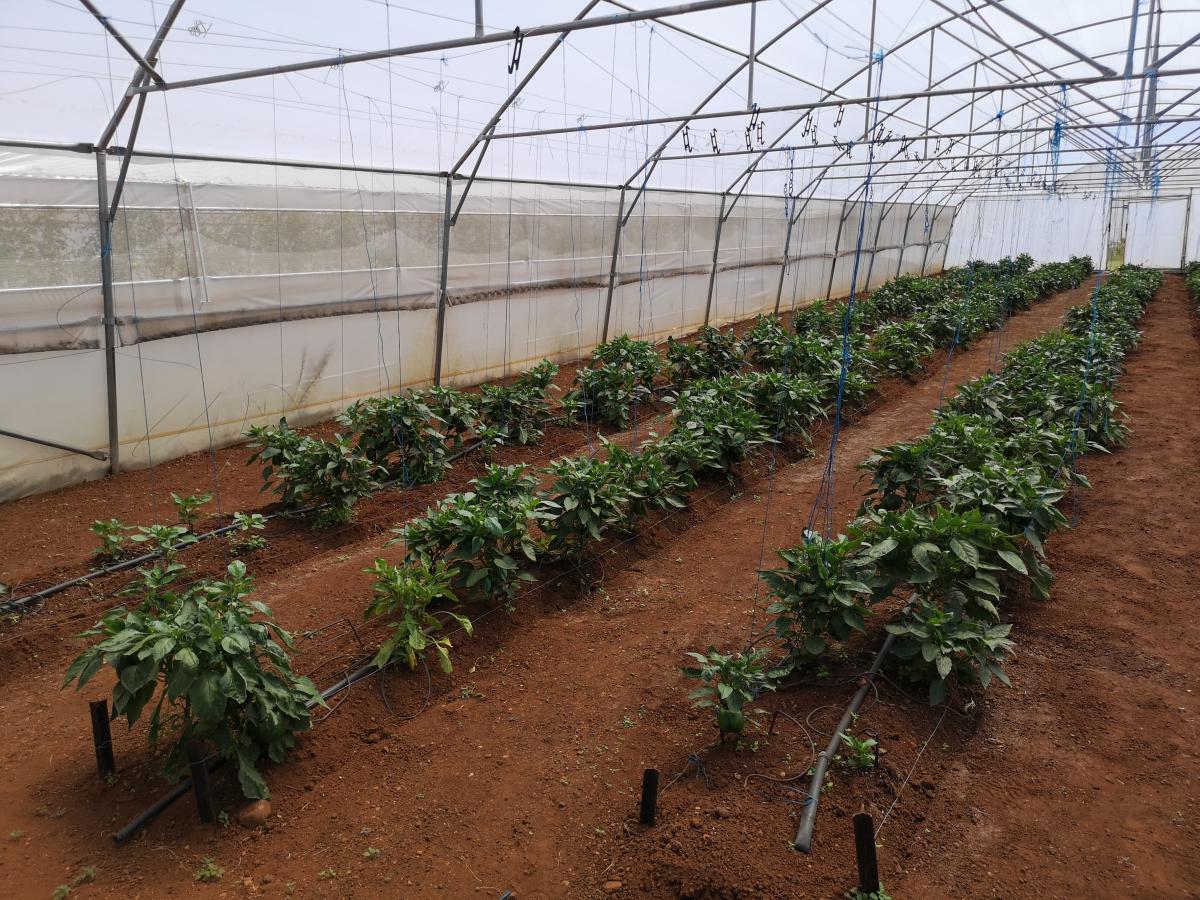
So far, Voice Out Deaf has managed to create about seven jobs.
The cooperative produces tomatoes, green pepper, lettuce and spinach.
“The popular vegetables will become available throughout the year at affordable prices,” she said.
Victoria said there were many advantages to using the state-of-the-art agricultural facility to grow vegetables. This includes irrigation facilities, effective time for production, modern machinery like tractors used in farming to make ploughing and harvesting faster, and it helps to yield a high quantity of crops.
The cooperative sells its products to the local fruit and veg market, street vendors and local residents.
Victoria said when the cooperative started two years ago it was difficult to access the market.
“Access to market is no longer a problem. Instead, we have more market than what we produce,” she said.
However, she acknowledged that it is generally difficult for people living with hearing impairment to do business as many customers struggle to communicate with them.
“Compared to people who are hearing, the deaf population faces notable challenges in finding jobs as well,” she added.
She said the cooperative plans to improve the quality of food produced in South Africa in future, and to offer horticultural training for farmers in the Rand West.
“We also want to explore the ever-growing demand for food in South Africa, to increase the Gross Domestic Product (GDP) of South Africa, to create job opportunity for local youths in the Rand West, and to introduce modern farming techniques to deaf people in our area,” she said.
About agri-parks
- Government wants to bring approximately 300 000 new smallholder farmers into the agricultural sector and to create 145 000 new agro-processing jobs through the Agri-parks Programme.
- The programme is also aims to bring one million hectares of land into production.
- The intention of the Agri-parks Programme is to ensure that farmers own at least 70% of the wealth creation opportunities created by the programme.
- The Department of Rural Development and Land Reform, in partnership with the Department of Agriculture, Forestry and Fisheries and other spheres of government, is rolling out the Agri-parks Programme to all 44 districts in the country.
- There will be one Agri-Park per District Municipality.
- Agri-parks will be supported by government for 10 years to ensure economic sustainability.
Are your children cyber safe?
Are your children cyber safe? angenithaWhen people use the Internet, cell phones, or other devices to send or post text or images intended to hurt, intimidate or embarrass another person – this is cyberbullying.
It can be a painful experience, especially when it affects school learners who are also using technology and social media to communicate with friends and family.
According to Basic Education spokesperson Elijah Mhlanga, cyberbullies use voice messages, text messages, images, videos, websites or personal web pages to repeatedly harass, intimidate or embarrass another person or a group of people.
In most cases, Mhlanga said, bullies pretend to be other people online to trick others.
They spread lies and rumours about victims; trick people into revealing personal information; send or forward mean text messages; and post pictures of victims without their consent.
“Cyberbullying can pose a serious barrier to learning when it is directed to learners,” he said.
Mhlanga advised learners to never give out their personal information online, whether in instant message profiles, chat rooms, blogs or personal websites.
“They must protect their passwords. The only people who should know their passwords are their parents,” said Mhlanga.
The department has the following tips for learners who have been victimised and those who know someone who is being cyberbullied:
- If someone sends a mean or threatening message, do not respond. Save it or print it out and show it to an adult.
- Never open emails from someone you do not know or from someone you know is a bully.
- Do not put anything online that you would not want your friends or classmates to see.
- Do not send messages when you are angry.
- Help children who are bullied online by not joining in.
- Show bullying messages to an adult.
- Always be as polite online as you are in person.
- Be aware that cyberspace is public space and online messages are permanent.
He also said parents should know about cyberbullying and get involved in preventing it.
What parents should look out for:
- Emotional signs: Your child becomes withdrawn or shy, shows signs of depression, is extremely moody or agitated, is anxious or overly stressed out, and shows signs of aggressive behaviour.
- Academic signs: Your child does not want to go to school, gets into trouble at school, skips school, loses interest in school and their marks suffer.
- Social signs: Your child suddenly stops using the computer, changes eating or sleeping habits and has nightmares, no longer wants to participate in activities they once enjoyed, they hurt themselves, attempts or threatens suicide and suddenly changes friends.
Capturing the imagination with reading
Capturing the imagination with reading angenithaImagine being able to give your child the world and all the knowledge in it. Anyone can do this, thanks to the magic of cheaply priced books.
In fact, you mostly do not have to spend a cent, as a library card instantly gives you access to thousands of books, free of charge.
By picking up a book, you give your child the keys to open doors to worlds that would otherwise be impossible to reach. Children living in Mqanduli in the Eastern Cape can use their minds to go anywhere they wish in the world.
Children’s book author Vuyolwethu Madanda agrees, saying reading sets children up for future success.
“Through reading, children can learn the art of logic. This is a skill that is carried through life’s learning, one that is transferable to different learning areas and school subjects.”
In her upcoming book, Iholide eCoffee Bay (Holiday in Coffee Bay), Madanda wants children to experience the joy of the simple things in life – playing out in the sun by the sea – even if they have never been to the beach.
“I want the reader to feel the warmth of the sun; hear, smell and taste the ocean. The book is about the experienc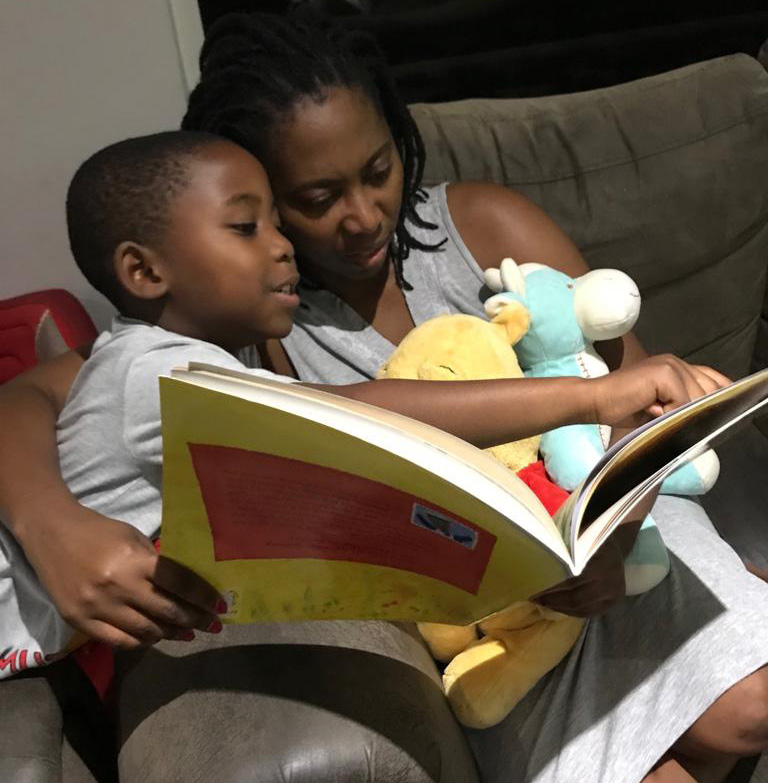 e of being on holiday and really just doing fun things out in the sun,” Madanda says.
e of being on holiday and really just doing fun things out in the sun,” Madanda says.
“A child who grows up reading about the universe around them grows up with a thirst for knowledge, understanding that they too have an important role to play in the world. Books give children the words to express themselves, and teach them what they need to know as they grow,” said Madanda.
“Reading does not only have to happen with books. On a commute, read any pamphlets and road signs you might pass. This will give your child a better understanding of the world around them.”
“If you are trying out a new recipe from a magazine, read the instructions with your child. Find age appropriate stories to share with them from the newspaper. This way, reading becomes part of daily life,” she said.
Madanda swears by reading as a way of bringing her family closer. She takes turns with her husband to read to her five-year-old son every night.
For this writer, who comes from a culturally diverse background, reading in as many languages as possible helps to give her son a sense of belonging and keeps him connected to his Xhosa and Venda roots.
“Reading can also help us break open conversations with our children. Many times you’re not really going to lecture a young child about the dos and don’ts of life… Sometimes the best way to do that is to find a book that addresses what you, as a parent, want to say. You can share many messages through stories,” says Madanda.
Top 10 tips to help children enjoy reading
1. Make books a part of family life – even if it is for five or 10 minutes, aim to read every day.
2. Join your local library – your children will get access to hundreds of books for free.
3. Read about something they are interested in – it does not matter if it is fiction, poetry, comic books or non-fiction.
4. All reading is good – do not rule out non-fiction, comics, graphic novels, magazines or leaflets.
5. Get comfortable! – whether it is on a beanbag or the sofa, make sure your child has somewhere comfy to read on their own too.
6. Ask questions – ask your child questions as you read to keep them interested in the story, for example, ‘Can you remember what has happened so far?’ and 'What do you think will happen next?'
7. Read whenever you get the chance – have a book or magazine for any time your child has to wait, like at the clinic or in the transport back home after school.
8. Read favourites again and again – re-reading helps to build fluency and confidence.
9. Enjoy bedtime stories – it is a great way to end the day and spend valuable time with them.
10. Make the most of rhyme and repetition – books with rhymes and repeated words or phrases are great for getting your kids to join in and remember the words. *Source: Pearson
Reading for 30 minutes with your child helps improve their literacy.
Flamingo Project saves Cape cancer patients
Flamingo Project saves Cape cancer patients JoyThe Flamingo Project is funding and helping breast and colorectal cancer patients at the Groote Schuur and Tygerberg hospitals to undergo life-saving operations.
 Dr Liana Roodt, the head of the Flamingo Project, said that over 500 women in the Cape have already been able to have operations for breast cancer as a result of the project.
Dr Liana Roodt, the head of the Flamingo Project, said that over 500 women in the Cape have already been able to have operations for breast cancer as a result of the project.
She explained that the project raises funds for those who cannot afford treatment costs and donates pamper packs to patients on the treatment list.
“To address the surgical backlog for breast cancer patients at these hospitals, we fund additional theatre time for these operations over weekends. We also coordinate surgical and anaesthetic volunteers to assist us to perform these additional surgeries.
“We also provide support to newly diagnosed breast, ovarian, cervical and uterine cancer patients, by providing weekly pamper packs to them at both hospitals,” said Dr Roodt.
Whilst the Flamingo Project conducts the surgeries, it does not decide who is eligible for treatment. “The hospitals decide which patients require surgery, which ensures that they remain in the system and complete the rest of their treatment. Surgery is only one aspect of the treatment plan to manage breast cancer,” Dr Roodt explained.
The Flamingo Project was launched due to the long patient waiting lists at both hospitals.
The project also assists with the post-treatment process and provides support to the staff working with patients, in a resource-limited environment. “We have created a patient room, donated two ultrasound machines, host yearly staff wellness days and assist where we can with the running of the Groote Schuur Breast and Endocrine Surgical Unit,” Dr Roodt confirmed.
Freedom comes with responsibility
Freedom comes with responsibility Joy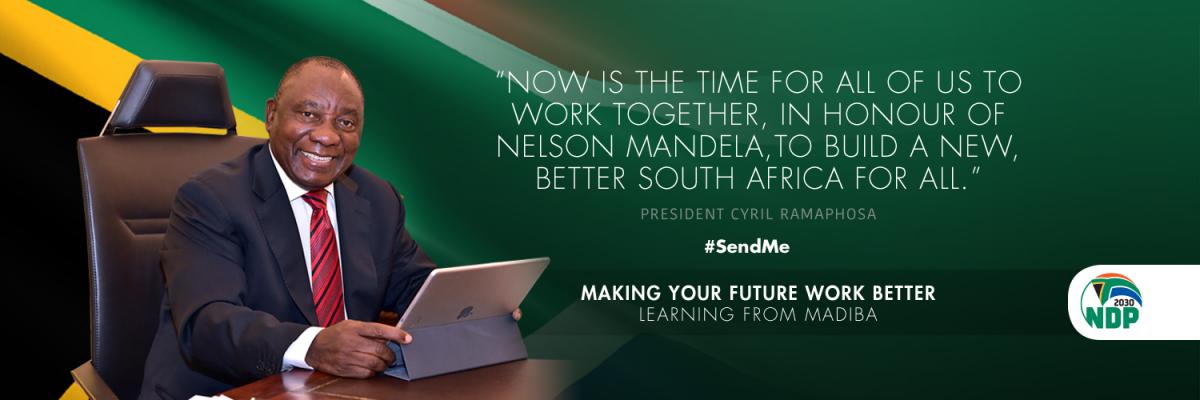
As a South African, what does freedom or Freedom Day mean to you?
For millions of us, 27 April 1994 will forever remain etched in our minds as an epoch-making day on which the country held its first democratic elections which ushered in the post-apartheid dispensation.
We fondly remember the inauguration of Struggle stalwart Nelson Mandela as the first democratically elected President of South Africa but we also recall our sadness at the high price paid by significant numbers of compatriots who had made extreme sacrifices in their fight against the apartheid system.
Today, with freedom and democracy firmly embedded in our society, we appreciate how the values of our freedom – which include equality, human rights, respect and dignity – bind us together as a peace-loving nation that is united in its diversity.
These values commit us to make a meaningful contribution towards building a country that is free of oppression and discrimination.
The Bill of Rights in our world-acclaimed Constitution of the Republic of South Africa of 1996, ensures the protection and promotion of basic human rights for all people in this beautiful country.
To breathe life into our Constitution, it is our duty and responsibility as a nation to treat one another equally and fairly, and with respect and dignity.
We are proud of the human rights culture that prevails in South Africa today, which serves as one of the cornerstones of our democracy and as a beacon to many nations elsewhere.
We treasure – and others respect – our constitutional order based on the tireless and indomitable resistance and deep sacrifice we had to invest to dislodge the apartheid system.
Based on this history, we know our nation will not fully enjoy the benefits of freedom as long as any among us are still subjected to discrimination, oppression and exploitation.
Gender-based violence (GBV) is one challenge in our society that undermines our hard-won freedom.
We must therefore do all we can to end GBV to entrench gender equality.
Gender equality demands that men and women should be free to develop themselves and reach their full potential, irrespective of their sexual orientation and beliefs.
For gender equality to be realised, the aspirations of men and women need to be valued on an equal footing, especially in terms of socio-economic opportunities.
Our Constitution clearly states that no-one should be discriminated against on the basis of race, gender, religion, national, ethnic or social origin, disability, culture, language, status or appearance.
In essence, we must secure the dignity of all who live in South Africa.
It is tragic that we experience violations of our Constitution and the law, such as we see around our schools with disturbing regularity.
Our children should be safe at schools and in our homes and communities, without living in fear of being sexually violated or killed. No one has the right to hurt, bully or intimidate others. Our Constitution states that “every child has the right to basic nutrition, shelter, healthcare and social services, as well as the right to be protected from maltreatment, neglect, abuse or degradation”.
We need to secure a better future for our children by protecting them, spending time with them, imparting sound values to them and setting examples for them that build healthy families and communities.
One seemingly small but vitally important area in which we can help our children and our nation is to overcome the challenge of a poor reading culture in South Africa.
Reading expands our minds, our vocabulary and truly opens up new frontiers of opportunity – in our country and the world.
We can help our children by setting aside 30 minutes a day to read with them. If we do that diligently and consistently, our children will be empowered and their comprehension skills will improve.
At the other end of the scale of life, the promotion and protection of the rights of older persons and people with disabilities in our society is of equal importance. They too deserve to be treated with respect and dignity.
Let us join hands in sustaining our freedom by promoting human rights in our homes, religious institutions, schools and communities.
Let us also work together to make sure that we protect our environment.
The Constitution provides that everyone has a right to an environment that is not harmful. We should all make an effort to clean the environment, reuse, reduce and recycle. Be exemplary to others in your community by picking up litter and putting it in the garbage bin.
As we mark a quarter century of freedom and democracy in April 2019, let us embrace and deepen our freedom – including the responsibility that rests on all of us to ensure that we live in a free and democratic society for centuries to come.
The world is full of examples where democracy has been replaced with systems of governance that feed off and feed into the worst inclinations of humanity.
We should never regress. Growing South Africa must remain our inspiration.
GBV is everyone’s business
GBV is everyone’s business angenithaAll South Africans must respond to Gender- Based Violence (GBV) and femicide.
In 2018 President Cyril Ramaphosa took a stand against this scourge by hosting the first GBV Summit in South Africa.
This was a platform where all sectors of South Africa which included government, civil society and survivors of GBV where under one umbrella to find solutions on how the country can stop abuse.
As a way of taking a stand and showing the country’s commitment to end GBV and femicide President Ramaphosa will sign a declaration which is also a plan of action of how South Africa will end this problem.
This is scheduled to take place at the Booysens Magistrates Court in Gauteng on the 28th of March.
President Ramaphosa will also be responding to the key areas that were discussed to the GBV Summit they are as follows;
- Political and community leadership must support and champion the cause of eradicating GBV and femicide;
- Political, community, family and business leadership should be held accountable through, amongst others, a Code of Conduct
- Immediately set up an Interim Structure, which is funded, with the eventual objective of establishing a national, multi-stakeholder Council. The composition of the Council must be inclusive and representative with consideration of at least 51% civil society and appointments must be transparent.
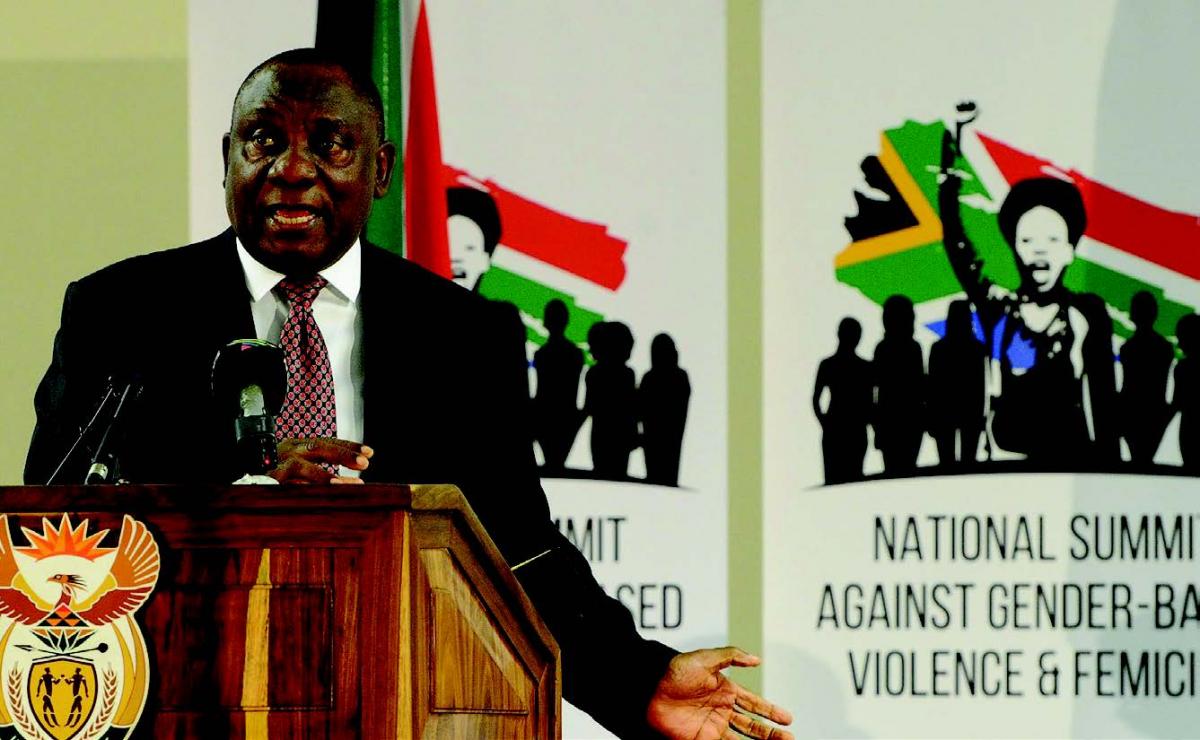
- Adequate resourcing of Thuthuzela Care Centres, sexual offences courts and shelters that respond to the needs of all people including people with disabilities and LGBTQIA
- A National Strategic Plan (NSP) on gender -based violence and femicide is developed within the next six months. The NSP should be resourced, implemented and monitored and evaluated on a regular basis
- Ensure that all laws and policies, programmes and interventions are adequately planned, costed and resourced in line within a gender- responsive planning, budgeting and monitoring evaluation framework, across government
- Retain, resource, strengthen and reinvigorate the institutional mechanisms including the national gender machinery;
- Promote woman-centred economic development;
- Strengthen the information and research base to develop effective, coordinated evidence- based policy and programming;
- A targeted, social behaviour change programme to address patriarchal values and norms and structural drivers of gender-based violence is developed and implemented across all sectors of South Africa.
- Evaluate existing education interventions with a view to strengthen them to ensure a comprehensive response at all levels of education.
- Convene a meeting of all communicators on GBV to adopt ethical guidelines, to cover language used, approaches for sensitivity (social media package) and social context training for the media sector
- Ensure ongoing capacity building, specialisation, strengthened coordination informed by legislation, norms, standards and protocols on gender-based violence;
- Fast track the review of existing laws and policies on gender-based violence to be victim-centred and ensure all other relevant laws respond to GBV;
- Implement the recommendations that have been identified from reviews and address legislative gaps
- Consider creating a regulatory framework for religious institutions to curb sexual abuses and crimes under the guises of religion.
- Revisit and fast track all outstanding laws and bills that relate to GBV and femicide, including the decriminalisation of sex work
No means No
Did you Know?
- The Booysens Magistrates Court built at Oakdene in the south of Johannesburg is making access to justice services more convenient for the community.
- Prior to the construction of the court communities in this area were serviced by the Johannesburg Central Magistrates Court which required them to travel up to 13 kilometres to be assisted.
- The facility was built at a cost of just over R242 million
What service does the Booysens Magistrates Court offer?
- Maintenance matters
- Domestic violence matters
- Childrenís Court
- Harassment Court matters
- Civil law services
- Small Claims Court services and criminal law services
How to contact the Booysens Magistrates Court?
Call 011 210 7300
What can I do if I am a victim of sexual violence?
Visit a Thuthuzela Care Centres which offers the following service:
- Comfort
- Medical care
- Access to the legal system
- Counselling
How to contact a Thuthuzela Care Centre in your area?
Contact the Gender Based Command Centre in your area by call 0800 428 428 or send Please call me to *120*7867#
Do you need a Thuthuzela Centres and are based on the South of Johannesburg contact?
- Baragwanath Thuthuzela Care Centre - 011-933 1229 / 3346
- Lenasia Thuthuzela Care Centre - 011 211 0632
Important Numbers
If you are being abused or suspect that someone is being abused call:
- South African Police Service 10111
- Childline 0800 055555
- Stop Women Abuse Hotline 0800 150 150
- Lifeline on 0861 322 322 or (021) 461 1111
Halala! Prof Tshifularo Halala!
Halala! Prof Tshifularo Halala! JoyA South African ear, nose and throat specialist has made world history by successfully operating on his patient’s middle ear to restore hearing.
A ground-breaking, world-first middle ear operation was recently performed by Professor Mashudu Tshifularo (55) at Pretoria’s Steve Biko Academic Hospital.
Using 3D printing technology, Prof Tshifularo and his team printed and replaced the middle ear’s three bones in an operation that took three hours.
“The desire to make a difference has always been in my heart. I have been working on this project for the past 10 years. I started to get excited two years ago and went to the lab to work. The 3D technology is very exciting and has really changed the way we do things,” he said.
Prof Tshifularo told Vuk’uzenzele that even though he faced some challenges during his research there was no turning back. “I would sleep thinking about it and wake up thinking about it. And, when I was busy, the ideas came and I would think ‘Wow, this is it’. Then I would go back to the lab and try,” he said.
He did not fear that the operation would go wrong, due to his extensive training. Prof Tshifularo and his team removed the patient’s three middle ear bones, which were broken in a car accident, and replaced them with the new bones, which are less than one centimetre each and made from titanium.
“The ear has the outer ear, middle ear and inner ear. The middle ear is made up of the membrane and three tiny bones. When you clean the ear you feel the membrane and when you touch it, it’s very sensitive. It’s like a speaker because it amplifies sound from outside.
“The three bones in the middle ear are the hammer, anvil and stirrup. Ligaments and muscles keep them in place. They sit in an empty space. They hang,” he said.
The medical breakthrough will enable those born without middle ear bones to have them built and fitted into their ear.
Prof Tshifularo left high-paying private sector jobs in favour of public service. The father of four said he stays in the public sector to train young doctors and to improve his research.
“I am encouraged and wondering what is next, but I am more determined to go back to the lab and do more research because I know academically there are a lot of questions that we need to answer.”
With a love for imparting knowledge, Prof Tshifularo is passionate about growing young talent.
“I want to train our young doctors and I want the impact not to be my own, but for the country and the continent,” said Prof Tshifularo, who hopes that his achievement will plant the seeds of motivation in young doctors.
Healing contained in Mazoyi Mixture
Healing contained in Mazoyi Mixture angenithaA young businessman is making inroads in the natural medicine industry.
Mazoyi Mixture medicinal bottles are flying off the shelves of pharmacies around the country and curing minor illnesses which affect young children.
The mixture made from aloe as a main ingredient is produced by Lwazi Marawu’s company called Mazoyi Group.
Marawu says the mixture cures illnesses such as colic, eczema, phlegm and wind. 
He started the business in 2009 when he saw how newly born babies and toddlers were affected by the four illnesses.
The 33-year-old businessman from Butterworth in the Eastern Cape said his mixture was tested by the Agricultural Research Council and the Egolibio Life Sciences Incubator.
The mixture is made at Marawu’s factory in Alice where he cooks the herbs with his team using machinery which were bought by a R50 000 loan from the Raymond Mhlaba Municipality.
Marawu said the business was distributing to the Link pharmacy group and retail chain stores.
“We distribute to selected Link pharmacies, Superspars and cosmetic chain stores. We also distribute to wholesalers such as City Wholesalers and Africa Cash and Carry.”
Marawu, who holds a bachelor’s degree in Public Management, added that receiving an education was vital for youngsters who aspire to go in to business He said studying business management helped him to think as a businessman.
Mazoyi Mixture is also distributed in Gauteng, with the secret to it is success being a good understanding of the company’s target market which are mainly in rural areas.
“Our business is about working with people who then refer others to our business because of how we deal with them,” he said.
Marawu said Mazoyi Mixture currently employs 14 people who produce 15 000 to 18 000 bottles of the mixture. These are packaged in 500 millilitre bottles.
I’m bipolar, what should I do?
I’m bipolar, what should I do? vuyelwanIf you suspect that you have a bipolar disorder or you have been diagnosed with one there are various things that you should and shouldn’t do to ensure effective treatment so that you can lead a fully-functional life.
A common finding with those who suffer from a bipolar disorder is substance abuse.
“People often turn to substances, including dagga and alcohol, in an attempt to make themselves feel better. But, the use of substances should be avoided,” said Dr Eddie Pak, a psychiatrist based at the Gauteng Department of Health’s Sterkfontein Psychiatric Hospital in Krugersdorp.
“Substances can trigger a vulnerability in some people, who could be genetically predisposed to a mood disorder. Substances also often make mood disorders worse. Alcohol, for instance, can cause depression,” he added.
Mental health disorders often have a stigma attached to them. “People often don’t reach out for help because they are worried about what other people will think of them. This causes unnecessary suffering because bipolar is treatable and controllable and people should get the help that they need,” said Dr Pak.
Sometimes people who have felt well for a long time hope that the bipolar disorder has gone away and that they don’t need medicine anymore. Unfortunately, medications do not cure it. Stopping them can lead to a relapse. Always talk to your doctor before stopping any medication.
Help yourself
Dr Pak urges people suffering from bipolar to educate themselves and become an expert in their illness. You will have the disorder for the rest of your life so speak to your doctor or a therapist, read books and articles and learn everything that you can.
“The more you know, the more control you have over your life,” says the South African Depression and Anxiety Group.
It’s very important to take your medication as prescribed and to let a new doctor know about your condition and the medications that you are taking.
According to the SADAG you can help reduce minor mood swings and stresses that sometimes lead to more sever episodes by maintaining a stable sleep pattern and regular pattern of activity; trying family therapy; joining a support group; and reducing work stress.
You can also develop a lifestyle that supports your wellness by using therapy and educational materials to improve your self-esteem and change negative thoughts into positive ones; enhancing your life with pets, music and activities that make you feel good; having a comfortable living space where you feel safe and happy; keeping your life calm and peaceful; taking good care of yourself; managing your time and energy well; spending time with affirming, fun people; doing exercises that help you relax, focus and reduce stress; recording your thoughts and feelings in a journal; creating a daily planning calendar; exercising and improving your diet.
Call your doctor or visit your closest mental health facility immediately if you have suicidal or violent feelings; changes in mood, sleep or energy or changes in medication side effects.
Let freedom reign
Let freedom reign tsoanaSport, Arts and Culture
Citizens who pass through the doors of the National Assembly and the National Council of Provinces (NCOP) will always be reminded of the fundamental principles upon which South Africa is founded on.
This was according to President Cyril Ramaphosa who unveiled the inscriptions depicting the values of the Constitution in Parliament, Cape Town recently.
Freedom and democracy, equality and diversity, unity and reconciliation are among several values that were written in bold letters on the steps of the NCOP as the President unveiled them.
He said public representatives need to ask themselves whether they contribute, in their own way, to forging a society characterised by equality and diversity, unity and reconciliation. 
“Are we building institutions that promote openness and participation, oversight and accountability?
“Are we pursuing a national programme that advances reconstruction and development?
“These are the principles for which many in our country fought and for which many lost their lives.
“The values that underwrite these inscriptions are reflected in the Freedom Charter, adopted in Kliptown in 1955,” he said.
The President said the values contained in the inscriptions have universal appeal in that they are consistent with the Universal Declaration of Human Rights and find resonance with the rest of progressive humanity.
“These principles therefore not only bind us together as a nation, but they bind us to the peoples of the world. It is significant that these principles are being inscribed on the steps of Parliament as we celebrate 25 years of a free and democratic South Africa.”
The values contained in the inscriptions were best embodied by former President Nelson Mandela and Struggle icon Mama Albertina Sisulu, and they did so with consistency and integrity, said the President.
“They were fearless champions of equality, understanding that South Africa would never be free until the rights, opportunities and material conditions of its people would no longer be determined by their race.
“They understood the other ways in which inequality was manifested.”
President Ramaphosa also called on public representatives to campaign in a responsible manner as the country gets ready to hold its national and provincial elections on 8 May.
“I call on all of us as leaders and representatives of our people – as we embark on elections work and campaign for our different parties – to continue to observe these values and do or say nothing that will cause disunity among South Africans.
“Let us all campaign responsibly and do our part to ensure free, fair and credible elections,” he said.
New ablution facilities handed to KZN school
New ablution facilities handed to KZN school angenithaPupils of Ubuhle Bemvelo Primary School in Mtubatuba, KwaZulu-Natal will now be using safe new toilets, thanks to a partnership between government and the private sector.
The 48 toilets were donated by Amalooloo, a private company, after a call made by President Cyril Ramaphosa for business to work with government in eradicating unsafe toilets. The Principal of Ubuhle Bemvelo Primary School, Oscar Sithole, said they are grateful for the toilets as they ensured that pupils are safe. He said the toilets would protect pupils from contracting illnesses.
“Having proper toilets in our school is a reflection of transformation. The school has been without proper ablution facilities for a long time,” said Sithole.
Of the 48 toilets, six were especially designed to be used by Grade R pupils.
“There are extra toilets for Grade R. There were initially 42 toilets but they have given us an additional six,” he said.
The handover of the toilets was done at the launch of the roll-out of Sanitation Appropriate for Education Initiative (SAFE) by the Minister of Basic Education, Angie Motshekga.
The SAFE initiative has seen the construction of 787 safe and grade-appropriate sanitation facilities, with a further 841 schools either in planning, design or construction stages across schools in the country.
Ubuhle Bemvelo Primary is the first school in KwaZulu-Natal to receive toilets as part of the SAFE programme.
“Studies show that proper sanitation and good hygiene practices increase learner participation in class while reducing absenteeism due to illnesses such as diarrhea and pneumonia,” Minister Motshekga said.
The Minister said the initiative sought to deliver ablution facilities speedily by working with private sector companies.
DID YOU KNOW
Through the Accelerated Schools Infrastructure Delivery Initiative about 226 sanitation projects and 21 inappropriate structures have reached completion
New resources for dyslexic kids
New resources for dyslexic kids angenithaA partnership between government, the MTN SA Foundation and Samsung is ensuring that dyslexic learners have access to better resources.
A multimedia centre at Tlhokomelo Special School in Meadowlands, Soweto, is being used to develop dyslexic learners’ reading, writing and mathematical skills.
People with dyslexia struggle to link letters to the sounds that the letters represent. The condition falls within the broader category of ‘invisible’ disabilities as it is not obvious or easily identifiable. The exact cause of dyslexia is still unknown.
The centre at Tlhokomelo uses modern technology to teach learners how to read and formulate sentences. It has helped 133 learners to improve their grammatical skills.
“Since the programme started, we have seen a lot of improvement in counting, reading and writing. Some learners were very confused by numbers, but now they are interested in them,” said Reuben Tshiswaise, one of the school’s teachers.
The programme uses computers to teach learners how to draw, sort colours and formulate and read sentences. “The programme develops their thinking skills,” Tshiswaise confirmed.
School principal Josh Maluleka explained that learners have pens which they use to scroll sentences, which the computer then reads aloud. The school has 16 teachers who have been trained to use the system.
“The learners have shown a huge improvement as they progress into other classes,” Maluleka said.
Social Development Deputy Minister Hendrietta Bogopane-Zulu attended the opening of the multimedia centre and said there was little understanding of dyslexia in South Africa.
“The need for the early identification and recognition of dyslexia in South Africa remains pressing as there is very little understanding and barely any intervention measures for dyslexic learners in our schools. Awareness of this learning difficulty remains low across the country,” said Deputy Minister Bogopane-Zulu.
Did you know
- Dyslexia affects about 10 percent of the population
- It is a language-based learning problem that makes writing, reading, spelling and the pronunciation of words difficult.
What are the symptoms of dyslexia?
- Difficulty in reading aloud.
- Slow and labour-intensive reading and writing.
- Problems spelling.
- Avoiding activities that involve reading.
- Mispronouncing names or words, or problems retrieving words.
No more bad hair days
No more bad hair days angenithaYoung female entrepreneurs’ natural haircare products are ensuring healthy ethnic hair in South Africa and abroad.
When Mantshadi Mokoena (33) struggled to find haircare products suitable for her hair, she started making her own.
In 2014 she launched the Nalane Group, with her younger sister Karabo, to produce natural haircare products under the Nalane ea Africa brand.
“The haircare range is infused with a unique blend of indigenous African oils that nourish and strengthen natural coils. All five products are essential for moisturising ethnic hair and making it manageable,” Mokoena said.
“We started testing the market in 2013 when we handed out samples to family and friends who wanted to know what my secret was for keeping my hair healthy,” she added.
Her dream of running a haircare company became a reality when Nalane ea Afrika won R250 000 in the Tabalaza Youth Development Programme, which is hosted by the Free State Department of Economic, Small Business Development, Tourism and Environmental Affairs.
The Mokoena sisters are based in Gauteng, due to other employment and studies, but the bulk of their clients are in the Free State where they have employed four distributors. The sisters look after the company’s Gauteng clients and sales have increased over the past five years.
Nalane Group also sells its products via an online store to ensure that South Africans and clients abroad have access to them.
“There is a big need for African products for Africans around the world. The challenge is always how to get the products to them. We recently listed our products in an online store for the United States and Canadian markets. Previously, we had to rely on family or friends travelling abroad to carry the products for us, so this has made it a lot easier,” she said.
Mokoena has encouraged budding entrepreneurs to not give up on their dreams, regardless of the challenges they face.
“The process to get assistance can take time, but our government is here to help us. We need to do our bit and come up with products and services that are bankable, instead of focusing on what is quick and easy,” said Mokoena.
Pupils a step closer to being licensed drivers
Pupils a step closer to being licensed drivers angenithaThe ownership of a driving licence can be a door opener for young job seekers. This prompted the Gauteng Department of Education (GDE) to give pupils from no-fee schools an opportunity to be qualified drivers.
Pupils from selected no-fee schools in Gauteng recently took the first step of being drivers by taking part in the K53 learner’s licence programme.
The objective of the programme is to equip young people with professional driving and life skills. In addition, it is aimed at tackling challenges related to road fatalities due to limited road safety education. 
Mbali Malekane from Selelekela Secondary School in Soweto, who received her learner’s licence certificate, said she was grateful for the opportunity that had been handed to her.
“The learner’s (licence) test at Langlaagte was difficult but it had to be done because it was a good opportunity,” she said.
“We are truly living in an equal South Africa where we all have the same opportunities,” she said.
The GDE’s plan is to have matriculants graduating with multiple skills.
“We are proud of all the learners who participated in this programme. Those who acquired the K53 learner's licences will gradually be assisted to obtain their K53 driving licence,” said Gauteng Education MEC Panyaza Lesufi.
The department said the programme participants are all grade 11 pupils over the age of 17 who come from public schools in Gauteng.
MEC Lesufi said his department is planning to partner with private sector companies to offer skills training.
He said the aim is to ensure that pupils no longer leave township schools in search of quality education.
Reduce, Reuse, Recycle, Recover
Reduce, Reuse, Recycle, Recover tsoanaAdvert
SA cuisine goes to Moscow
SA cuisine goes to Moscow tsoanaThe Department of Trade and Industry (the dti) is inviting businesses in the food sector to submit applications to participate in the 2019 World Food Moscow fair in Russia.
The World Food Moscow will be held from 24 to 27 September 2019 in Moscow, Russia.
The World Food Moscow was established in 1991. It is a major exhibition serving the global food and drinks industry.
According to the dti, exhibitors are grouped in nine main sectors to ensure that visitors can easily find products of interest, compare them and engage with key buyers.
“The World Food Moscow fair covers the food sectors including fruit products, juice concentrates, canned fruit and vegetable, dried fruit, herbs and spices, nuts and snacks, fisheries and tea products,” the department said.
The application forms and guidelines can be downloaded from: www.thedti.gov.za/trade_investment/emia_national_pavilions.jsp
The department will offer the following financial support to qualifying small businesses:
- Exhibition space and booth rental costs;
- Freight-forwarding of display materials;
- Air travel assistance up to R17 000;
- Daily subsistence allowance of R3 000 per day;
The importance of exhibiting
The department also said that trade shows could be one of the most effective marketing tools available for a small business.
“This is where customers are found in large numbers to see products in action and meet small businesses face-to face,” the department explained.
However, the department discouraged exhibiting companies from relying entirely on the efforts of the organiser to attract and keep visitors to their stands.
Tips on how to participate better during exhibitions
Pre-show marketing: It is vital in ensuring that the right people are aware of your presence at an exhibition. This includes potential clients and existing ones.
Examples of this strategy include mail campaigns, fax or email, telemarketing, special reports on the website, and use postcards or teasers weeks before the show to get the client's attention.
At the show: Ensure that all staff who will be manning the stand are presentable, approachable, and have a wide knowledge of the company and its products.
Provide them with all necessary material for promoting the product or service and enough business cards to hand to other exhibitors. Keep a record of visitors to your stand.
After the show: Follow up. Chase up leads, make appointments, call visitors who showed an interest as soon as possible while their memories are still fresh.
For more information on the application process contact Virginia Mbuyisa on 012 394 5988 or email: Vmbuyisa@thedti.gov.za as well as Hloniphile Nkiwane on 012 394 3496 or email: HNkiwane@thedti.gov.za
SA steps up efforts to curb women abuse
SA steps up efforts to curb women abuse vuyelwanPresident Cyril Ramaphosa has reiterated that women abuse has no place in South Africa.
“It should also have no place in our homes, at places of work, churches, schools and on the streets of our townships, on the pathways of our villages and also in our cities and towns,” President Ramaphosa said.
He was speaking at the official opening of Booysens Magistrate Court and the signing of Gender-Based Violence and Femicide (GBVF) Declaration in Johannesburg which took place on Thursday. 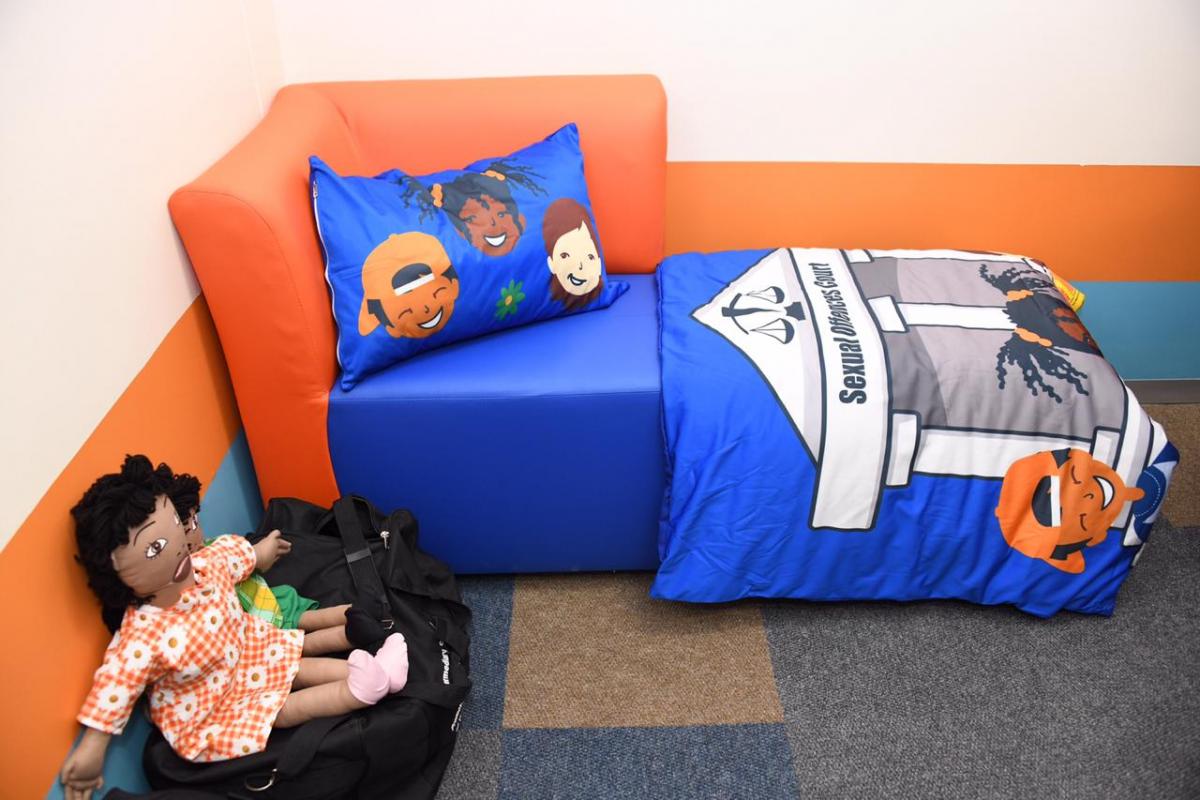
The state-of-the-art Booysens Court comprises 10 courts, including four district courts, civil court, family court, equality children’s court, children’s court enquiries, as well as two regional courts for criminal and sexual offences.
The declaration, on the other hand, is borne out of the National Gender-Based Violence and Femicide Summit, held in November 2018, in an effort to find solutions to GBV and femicide.
Addressing stakeholders and members of civil society, President Ramaphosa said that the summit opened the eyes and ears, and even the hearts, of many people to the gravity and impact of GBV in the country.
“We have heard the pleas of survivors of gender-based violence to be treated with respect by our criminal justice system. In opening this new sexual offences court in Booysens, we are affirming the right of the women and girls of this country to be treated with professionalism and empathy.
“The opening of the court and the declaration against gender-based violence and femicide are two of the measures we have put in place since the Presidential Summit convened in November last year,” President Ramaphosa said.
As a nation, the President said, South Africa is making a bold and unequivocal declaration that “we will not yield to gender-based violence”.
“We will not allow it to steadily consume our people, to erode our dreams of a stable and peaceful society in which all have equal rights and opportunities, regardless of their race, gender, sexual orientation or the circumstances of their birth.
“In signing this declaration against gender-based violence and femicide, we are saying as a collective, that the cancer of women abuse has no place whatsoever in our homes, communities, churches, schools, streets and our villages, towns and cities,” the President said.
Minister for Women Bathabile Dlamini said the South African Constitution places huge emphasis on non-sexism. She said this must be aligned with programmes that fighting GBV.
Dlamini called for the proper training of all people working in the justice system and that they should be sensitised to respect women.
End of secondary victimisation
Speaking on behalf of civil society, Dr Zubeda Dangor from the National Shelter Movement of South Africa, welcomed the signing of GBV Declaration and the opening of the court, in particular the Sexual Offences Court.
“We hope that with the opening of the Sexual Offences Court, the secondary victimisation will come to a stop so that it will be easier for victims of GBV to be able to come forth and get justice,” Dangor said. – SAnews.gov.za
School code of conduct explained
School code of conduct explained angenithaThe Department of Basic Education (DBE) defines a school code of conduct as a document that spells out the rules that learners must follow and the disciplinary system that will be enforced if the rules are broken.
The department’s spokesperson Elijah Mhlanga says that a school’s code of conduct applies to all learners when they are on the school’s premises, when they are representing the school or attending a school function.
He explains that the code of conduct is important because it spells out various issues relating to safety, security and discipline.
“These include, but are not limited to, general school rules; school and class attendance; safety of personal possessions; school uniform and appearance; and providing a clear view on the school’s disciplinary systems, its grading of offences and the prescribed punishment or remedy thereof,” Mhlanga explains.
Who drafts it?
Mhlanga says a school’s management team, which includes teachers and the principal, is responsible for drafting the code of conduct. It must then be adopted in consultation with the school’s governing body to ensure that parents are aware of it.
After it has been adopted by the governing body, it is monitored by the Provincial Department of Education. “This is done by circuit managers who vet codes of conduct in line with the South African Schools Act and the South African Constitution,” said Mhlanga.
He adds that the DBE seeks to ensure that the codes of conduct are uniform, inclusive and enforced.
The national department has a sample code of conduct that schools can follow when drafting their own and gives examples of what should be included.
“If parents are not happy with something in the code of conduct, such as issues relating to learner’s hair or uniform, they may raise their concerns to the school’s management team,” Mhlanga says.
He adds that parents can raise issues directly with the school in question as the code of conduct is specific to each school. Parents and caregivers can also escalate issues to their district education office.
For more information, contact the Department of Basic Education’s Call Centre at 0800 202 933, email callcentre@dbe.gov.za or contact the switchboard at 012 357 3000.
Students set to be free from historic debt
Students set to be free from historic debt vuyelwanThe provision of money to pay for historical debt is a welcome relief for the National Student Financial Aid Scheme (NSFAS) funded university students.
An amount of R967 million has been allocated by the Department of Higher Education and Training for the payment of fees for students owing ‘historical debt’.
The department said the money would assist students who owed fees from the previous year.
Advanced Certificate in Public Administration student Abongile Mbonja said the money will help pay her debt of R37 000.
Mbonja says she owes the University of Fort Hare money for her 2018 fees.
“The money will help me since I will be able to register all my modules. With the debt I accumulated I would not have been to register a particular module for the second semester so this will help me continue with my studies,” she said.
The 26 year-old student said the funding has come at the right time. “I will be to graduate for my higher certificate in September. The announcement has helped offload the burden that I carried. I can now focus on my studies.”
Minister of Higher Education and Training Naledi Pandor announced that her department will fund 52 514 students who qualify for the funding scheme.
The department’s spokesperson Lunga Ngqengelele in a statement said: “The allocation is specifically for those who had been funded on the previous funding scheme of the NSFAS prior to the significantly improved funding support that began in 2018.”
Ngqengelele said the students who will benefit are those who were “required to fund part of their costs through family or own funding and were not able to do so”.
Ngqengelele said that the historic debt refers to money owed to the university by continuing NSFAS qualifying senior students who were registered in the 2018 academic year and were funded by NSFAS.
The students are those who come from families with an income threshold of R 122 000 per year.
Mbonja said the funding will ensure that she graduates with a bachelor’s degree in two years’ time. She said the announcement had created excited among her fellow students.
Teach children how to recycle
Teach children how to recycle JoyRecycling’s ‘three Rs’ - reduce, reuse and recycle - are very useful for managing the waste we produce and reducing its impact on communities.
 Piles of rubbish in streets, parks and fields are common in South Africa. Litter not only spoils otherwise beautiful areas, it also causes water and soil pollution, and poses a health risk. It is therefore important to teach children how to produce less waste and how to recycle.
Piles of rubbish in streets, parks and fields are common in South Africa. Litter not only spoils otherwise beautiful areas, it also causes water and soil pollution, and poses a health risk. It is therefore important to teach children how to produce less waste and how to recycle.
According to the Department of Environmental Affairs, South Africans can find ways to reuse old and broken items. For example, old jars can be used to store items.
The department explained that recycling is a process of transforming rubbish into a raw material that can be shaped into a new item. It is important for communities to buy items that can be recycled such as glass, plastic and paper.
Teachers have a vital role to play in educating children about recycling. Through recycling programmes at schools, children can be taught how to manage waste responsibly from a young age.
How to set up a recycling programme in your school
- The first step of setting up the programme is to appoint a recycling committee.
- The second step is to find out how much waste the school is throwing away and the type of waste produced. Collect waste and separate it into the various types, then work out the weight of the waste produced a month.
- Third step is to identify waste to be recycled and decide which types of waste the school will focus on. Contact recycling companies in the area to make arrangements for the companies to collect the waste regularly.
- Fourth step is to mark the different types of waste and assign people to various roles, such as collecting rubbish or separating waste.
- Fifth step is to start your programme and make sure that everyone in the school knows about it so that they can recycle too.
The dangers of childhood depression
The dangers of childhood depression JoyWith rising reports of youth suicides in South Africa – the youngest of which was a mere six years old in 2017 – it is important for adults to learn everything they can about depression and how to spot it in children.
In 2018, the South African Depression and Anxiety Group (SADAG), which deals with hundreds of calls each day relating to youth and mental health, reported that 31.5 percent of teen suicide attempts required medical treatment; 17.6  percent of teens had considered attempting suicide; one in four university students had been diagnosed with depression; and over 20 percent of 18 -year olds had one or more suicide attempts.
percent of teens had considered attempting suicide; one in four university students had been diagnosed with depression; and over 20 percent of 18 -year olds had one or more suicide attempts.
According to the World Health Organisation, half of all mental health conditions start by 14 years of age, but most cases are undetected and untreated.
“That’s why it is important that parents, teachers, grandparents, loved ones and communities know that depression can affect young people too,” the SADAG said.
It is important to know the signs of depression and suicide and how to get help before it is too late.
Signs of depression
According to psychiatrist Dr Pralene Maharaj from the Gauteng Department of Health’s Sterkfontein Psychiatric Hospital in Krugersdorp, signs that a child is suffering from depression vary according to their age and brain development.
Some of the warning signs include no participation in previously enjoyable school activities, weight loss or gain, sleeping problems, not completing homework, lack of participation in the classroom, a drop-in marks and difficulty concentrating.
“However, depression is hard to diagnose in children because it could be an underlying problem. For example, perhaps they have a learning difficulty and are not coping at school. It is very important that they [children] receive the correct diagnosis and are treated holistically,” she said.
Teen suicide
SADAG is seeing increased cases of depressed children and teens and is receiving more calls from children who feel helpless, hopeless and even suicidal.
While some suicides may occur without any outward warning, most do not. The most effective way to prevent suicide is to learn to recognise the signs of someone at risk, take these signs seriously and know how to respond to them.
Danger signs include:
- previous suicide attempts;
- talking about death or suicide;
- depression;
- change in sleeping patterns;
- change in appetite or weight;
- speaking or moving with unusual speed or slowness;
- fatigue or loss of energy;
- feelings of worthlessness, self-reproach or guilt; and
- extreme anxiety, agitation or enraged behaviour; and drug or alcohol abuse.
What can I do?
Childhood depression is serious and it is important that the child is properly evaluated. Visit your closest mental health clinic, hospital or doctor as soon as possible. You can also contact:
a Cipla 24-hour mental health helpline at 0800 456 789,
a SADAG helpline at 011 234 4837 or the Suicide Crisis Line at 0800 567 567.
The power of reading together
The power of reading together angenithaTelevision icon Oprah Winfrey started a reading revolution in the United States when she started her own book club in the 1990s. Books on her recommendation list became best sellers overnight and jumpstarted the careers of many great writers. It also motivated people around the world to start their own book clubs and begin to enjoy reading again.
In South Africa, national reading for pleasure campaign, Nal’ibali, runs more than 4 000 reading clubs for children, and trains individuals and organisations to run reading clubs for children in their communities. 
Nal’ibali spokesperson Sally du Preez said, “Reading clubs are relaxed, informal spaces where children can enjoy books, stories and other literacy-related activities such as songs and games in their home languages as well as English. The sustainability of these reading clubs is supported through mentoring, resource provision and partnerships.”
The campaign runs over
4 000 active reading clubs in all nine provinces reaching over 120 000 children, and 84 percent of these clubs meet at least once a week. The reading clubs give children regular, enjoyable opportunities to learn, said du Preez.
She added that over 22 000 people had been trained in reading for enjoyment, at least 8 959 people were currently running or volunteering at reading clubs, and more than 17 000 people had joined Nal’ibali’s broader network of literacy activists known as “FUNda Leaders”.
Du Preez said FUNda Leaders are trained in teaching creative self-expression, exploration and thinking together.
“If activities around reading are in languages that children do not understand, using methods that are not accessible or fun, they become meaningless and undesirable for children. Whether formal or informal education, reading has to be meaningful. We keep this in mind when we train adults on literacy and storytelling,” she said.
How to start a book club
1. Invite friends to join the club. You can invite as many people as you want, including neighbours, friends or family.
2. Decide on the kind of book club you want to have – will you read books of a specific type only - for example, books written by South African writers only - or a variety of books?
3. Decide with book club members on where you will hold book club meetings.
4. Hold a pre-book club meeting to decide which book you will read first, and how often you will meet to discuss the book.
5. Keep book club meetings exciting and interesting by changing venues, creating themes and questions for each meeting.
If you would like to join the Nalíibaliís FUNda Leader network logon to www.nalibali.org, on the mobisite - www.nalibali.mobi, or call centre on
021 180 40 80.
Travel smart abroad
Travel smart abroad tsoanaTraveling or working abroad can be exciting, but it can also be traumatic if one is faced with an emergency or death.
The Department of International Relations and Cooperation's (DIRCO) Consular Service has the “Travel Smart” campaign to guide South Africans on what to look out for when visiting or applying for wor k outside national borders.
k outside national borders.
“Travel Smart” is aimed at encouraging South Africans to research their destinations and the laws of the countries they seek to visit or apply for work.
The campaign seeks to improve the general understanding of the Consular Services provided by the DIRCO in the country and abroad. It also gives South African travellers tips on what to do in the event of an emergency when in a foreign country.
South African travellers can be offered urgent advice in the event of a natural disaster, civil unrest or family emergencies, by a South African Embassy or consulate officials.
During the launch of the campaign, Department of International Relations and Cooperation Deputy Minister Reginah Mhaule said most South Africans face the reality of being destitute in foreign countries and under these circumstances often seek assistance without prior knowledge of what services the department is mandated to provide.
“This situation must be changed and I believe that the Consular Service campaign will enable us to do so,” she said.
How to stay safe abroad:
- Acting responsibly and being aware of the risks (check news reports of any problems in the area you will be visiting).
- Registering at a South African Embassy or Consulate General abroad after arrival at your destination or before your departure from South Africa.
- Taking out full travel insurance and overseas health plan.
- Checking with your doctor or travel clinic what vaccinations and other health precautions you may need to take for your trip.
- Filling in the next-of-kin details in your passport.
- Not being tempted to use drugs.
- Respecting the culture and customs of the countries you are visiting.
This month in history
Saturday, 1 April 1961 – Robben Island is turned into a maximum security prison
It is believed that thousands of years ago, people lived on Robben Island. After the Dutch had settled at the Cape, the island was used mainly as a hospital for people with leprosy and the mentally and chronically ill because it was believed it was safer to keep them separated from the rest of the community. Patients were quarantined on part of the island, while the other part was used as a prison.
During World War II, the island was used mainly as a training camp. The island was officially turned into a maximum security prison in 1961. It was used to incarcerate more than 3 000 political prisoners between 1961 and 1991, the most famous being Nelson Mandela. Since 1997, the island has been serving as a museum and heritage site. (Sahistory.org)
Western Cape runs a healthy lifestyle campaign
Western Cape runs a healthy lifestyle campaign tsoanaSport, Arts & Culture
The Western Cape Government is helping residents to make healthier decisions about their lifestyles through healthier eating habits and physical activity.
The Western Cape on Wellness (WoW) initiative encourages community members to be more active.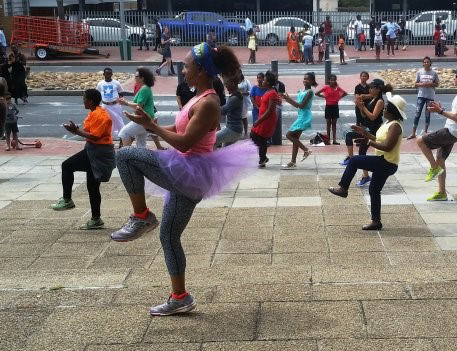
It includes active public sessions where communities can take part in activities such as aerobics at no charge, and the sessions are open to all ages and fitness levels.
By participating in this programme, government says residents can reduce the risk of getting non-communicable diseases.
Western Cape Government gym instructor Neil Naidoo recently led a public aerobics class in the Iziko Museum.
“Physical inactivity, unhealthy eating and an unhealthy weight are considered major risk factors for a number of harmful health outcomes including obesity, diabetes, hypertension, cardio-vascular diseases and other non-communicable diseases,” he explained.
The risk profile of ordinary South Africans indicates that nearly seven out of every 10 women and one in three men are overweight or obese; one in three women and one in five men have hypertension.
According to the WoW initiative, the risk profile also shows that between 11 and 13 percent may be diabetic or have impaired glucose tolerance.
Research also shows that over 80 percent of the South African population relies on the state services for healthcare.
“We are mobilising and introducing the entire public to a healthier lifestyle. This shows that you don’t have to go to a gym to live a healthier lifestyle,” he said.
“You can engage in any sort of movement, actions or mobilisation of your body. If you are dancing or doing anything that’s active, you are making a move to a healthier lifestyle. The entire public is welcome to participate in the WoW Active Public sessions,” he added.
The WoW Active Public sessions take place every Wednesday in the Company’s Garden or in the Whale Well of the Iziko Museum.
The Western Cape Government Gym also hosts employees' only sessions on Wednesdays from 11:15 to 11:45.
What will people say?
What will people say? tsoanaAdvert
Young chicken farmer breeds success
Young chicken farmer breeds success angenithaMafikeng chicken farmer Siyabonga Mhlabane (26) has gone beyond the average chicken farming enterprise by raising, slaughtering, processing and packaging his own chicken products.
Mhlabane spotted a gap in Mafikeng’s poultry industry while studying agriculture at North West University.
“I fell in love with poultry and chose poultry science as a module. That’s when I began to understand the potential that the industry has and the production shortages that South Africa faces,” he explained.
South Africans consume more chicken than the country produces, which ensures that Mhlabane has a market for his chicken.
Mhlabane chose to enter into the full value chain so that he could maximise his business potential.
He explained that the major suppliers provide the best quality chickens to major food outlets and the lesser quality chickens then go to retail stores, where consumers shop.
Mhlabane wants to fill the void and ensure that consumers get the best chicken meat in the market.
He raises his own chickens, before sending them to a local abattoir to be slaughtered, processed and packaged under his brand, Alfred Daisy Poultry.
The farm, which processes 3 000 grain-fed chickens a month, sells to fast food outlets, supermarkets, restaurants and members of the community.
Mhlabane wants to grow his business so that he can open his own abattoir and supply bigger markets.
“Studying modules such as agri-business propelled me to start my own business in 2018,” said Mhlabane.
When he first started the business, he used to slaughter manually for his clients.
He told Vuk’uzenzele that he started his business with 100 chicks, after receiving a R7 000 loan from his mother who was also a chicken farmer.
He then received additional funding of R50 000 from the National Youth Development Agency.
Young dairy farmer dreams big
Young dairy farmer dreams big angenithaA Free State dairy farmer is doing all she can to turn her dairy farm into a profitable business.
Helping her father manage his dairy farm in her youth has ensured that Beauty Mokoena (31) is now regarded one of the best subsistence farmers in the Free State.
In 2018 Mokoena was recognised as the best producer in the Thabo-Mofutsanyane District and received the MEC Special Award for her efforts during the 19th Annual Female Entrepreneur Ceremonial Awards.
The ceremony was held by the Free State Department of Agriculture and Rural Development to acknowledge and encourage the participation of women, young women and women living with disabilities in the agricultural sector.
“I used to help my father with minimal duties such as cleaning, attending meetings and buying essentials that he needed for the farm.
“Spending a lot of time with him made me develop an interest in farming,” said Mokoena, who hails from Mangaung village in Qwa-Qwa.
After completing matric, Mokoena enrolled at Maluti TVET College to study for a Diploma in Primary Agriculture. Unfortunately, her father passed on when she was in her third year and she had to take over the farm.
“Studying helped me a lot because I learnt about animal production, management, maintenance, how to take care of livestock and their medical needs, and agriculture as a business. The nice thing about agriculture is that you learn new things every day, as you come across different challenges,” she said.
The dairy farm does not currently operate as a formal business, but Mokoena’s family of six survives from what it produces.
“We currently have 12 cows and we milk seven of them. On a good day they can produce up to 45 litres of milk. I want to turn the farm into a profitable business one day,” she said.
Mokoena revamped the farm a bit with the money that she won when she received the MEC Special Award.
She was also offered an opportunity to represent the Free State in China in 2018, during the seminar on Modern Agric-Economy Management for Developing Countries.
She encourages young people, especially from rural towns, to take farming seriously and consider it as a career.
“The fact that jobs are scarce should encourage young people to be determined and passionate about agriculture because it is one of the things that most of our parents have knowledge of,” she said.